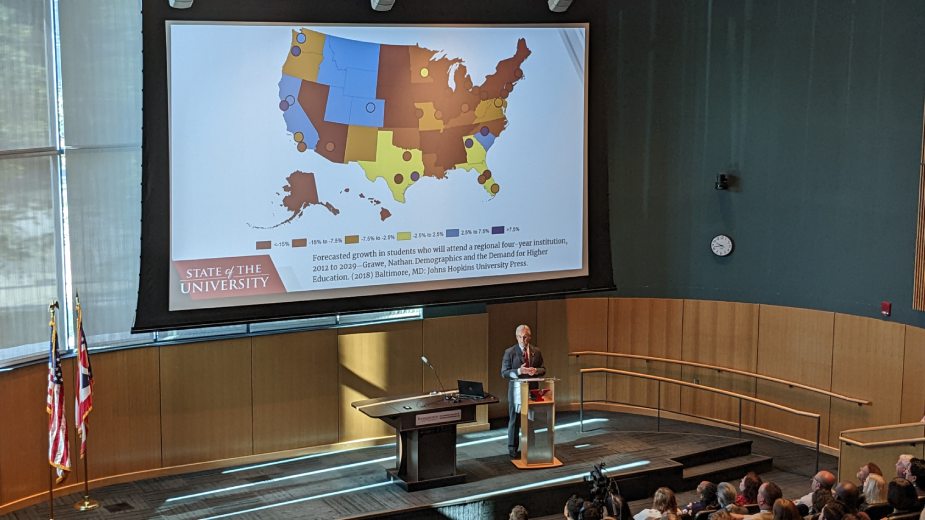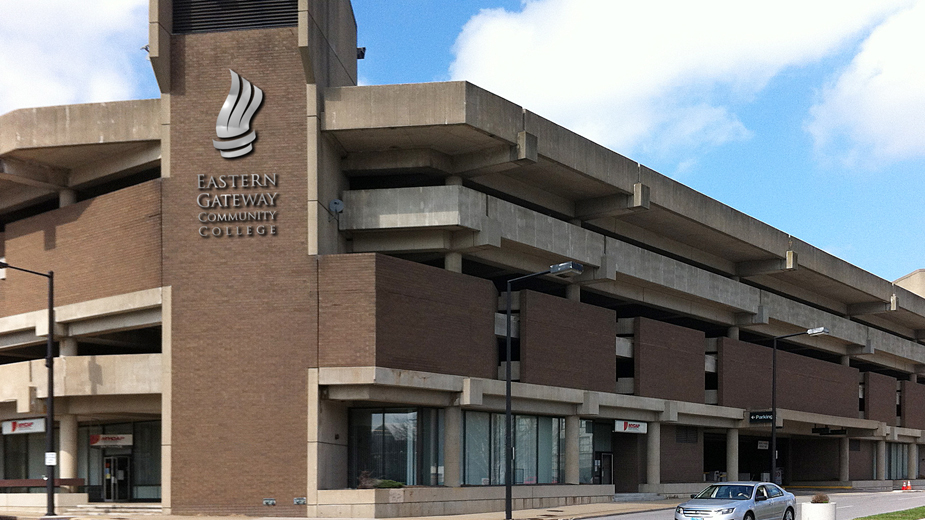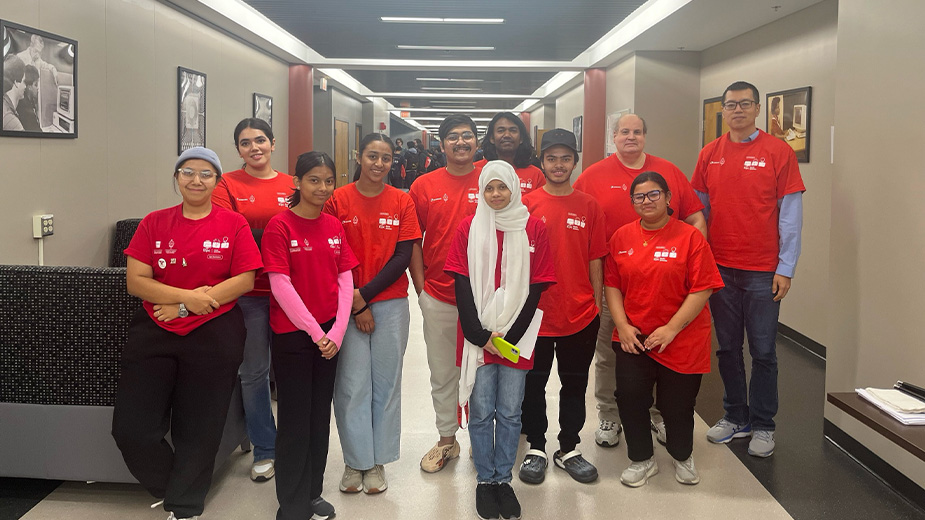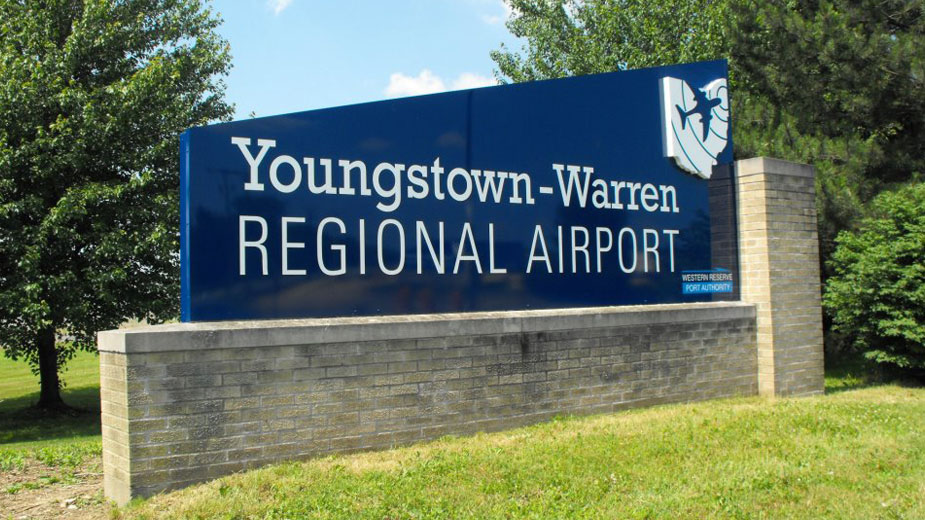Tressel Illuminates YSU’s Successes, Disappointments, Future Plans
YOUNGSTOWN, Ohio – Always excited for the first day of school, just like when he was six years old, President Jim Tressel delivered his last state of the university address before faculty at the Williamson College of Business Administration Wednesday morning.
Youngstown State University will resume classes Monday for the fall semester. Students are moving back to the campus area and the faculty, including many new ones introduced at the address, is gearing up.
“It’s kind of a fun time to sit and reflect for an hour and then know we have to roll our sleeves up and have a great year,” Tressel said, although after announcing his intentions to step down in February, he notes there is a different feel for this school year than the others in his long career.
“Enrollment, clearly is the challenge for all institution of higher education,” Tressel said. “It’s obviously an expensive endeavor, it’s something that we believe in totally, the impact that YSU has in this region, I don’t know if anyone could ever fill it and so we’ve got to make sure that we sustain it, that we do it well, that we turn out the workforce that our region needs and that our state needs and our world needs.”
During his address that lasted nearly an hour, Tressel showed a chart of the forecasted growth for students who will be attending a regional four-year institution between 2012 and 2029, which shows a decrease greater than 15% for both Ohio and Pennsylvania.
“Everyone is competing for the same group of students and the pie’s getting a little bit smaller and the opportunities are getting a little bit wider, but again that’s the fun of it. The fun is trying to figure out how to be the best and our people will do that.”
One of the ways YSU leadership is hoping to draw more students is through an upgrade of the Kilcawley Center. Tressel said other regional universities have students centers built in the 2000’s, while the first part of YSU’s Kilcawley was built in 1964.
“I think our students deserve different types of spaces than what they needed in 1964. So our people have studied it. Now we what we have to figure out is how can we afford it.”
The Excellence Training Center at Kohli Hall was the dream of the engineering faculty about seven year’s ago, Tressel said, a way to work with the resources in the community like America Makes and the Youngstown Business Incubator.
Opening last July, the Excellence Training Center has issued 2,000 industry credentials and allowed companies to partner with the university to train workers and faculty to research grants. Tressel said the program is already to the point where it is considering possible expansion.
The program is training students in IT, Siemans software and industrial maintenance. It includes a partnership with EGCC for machining and four-year YSU programs in robotics, foundry work and advanced manufacturing.
A skilled workforce is important to local businesses and Tressel emphasized the need for YSU to train those people wanting to begin their professional careers for local jobs.
Local people will always make up the largest group of students at YSU and training them for jobs that will keep them here will lead to better sustainability for the university. But the manufacturing jobs of today are different than the ones from generations ago.
“It’s all about manufacturing with your mind,” Tressel said.
Excellence Training Center has 25 employees all being paid for with outside funding.
Ultium has asked YSU to help train the 2,000 people who will work there, Tressel said, with the university involved with Foxconn and the future of electric vehicle and tractor manufacturing in the region.
Additionally, Tressel said Intel in Columbus will need other businesses as part of the supply chain throughout the state.
“There’s going to be so many opportunities,” Tressel said “I think the thing that I wish we could sell a little bit better, that when you come here and live here, with Millcreek park, the proximity so close to Cleveland and Pittsburgh, the cost of real estate, all of the different things we have going for us, we just have to have people come and experience that and then give them the types of jobs that meet their career goal ladders, I think if you put those two things together, this valley could have an emergence back.”
Students are working to help businesses with data mining, determining what those numbers mean to them.
Also highlighted by Tressel is a partnership between the Division of Workforce Education and Innovation and Bud Williamson, who Tressel said has a dream of having students in the region studying science and working on problem solving. Williamson has donated 200 acres, built buildings, a runway and ponds, which Tressel said has opened up unlimited opportunities for YSU. The gift also includes a $3.5 million endowment to maintain it.
“We’re only going to be limited by our creativity,” Tressel said. “Creating that division that helps us work with the faculty, work with the colleges, work with the community, work with business and industry to me is a huge victory for us and we’re awfully proud of what they have done and anxious to find out what more they can do.”
One disappointment Tressel expressed during the address is the inability to increase the compensation for the employees and faculty at the University, noting that is something he would like to look at for the future.
“When you have great talented people, who work hard, who love this place, we want to be able to find a way to compensate them.”
Tressel touted the success of some members of the faculty in the past year, which he said achieved a12-year high of nearly $11 million in grant activity, obtaining 96 different grants for YSU.
He also talked about how hard YSU has been working to improve, including new online platforms such as CRM Recruit and CRM Advise. The first helps streamline admissions and get acceptance and financial aid packages out to prospective students quickly. The second assists in advising and mentoring students, which Tressel credits, along with other changes in advising practices, with an improvement from a 64% retention rate of first year students to nearly 80%.
Penguin Pass allows students to go online and easily see what courses they still need as they go toward graduation.
Finally, Tressel talked about the Higher Learning Commission accreditation the university was aiming for in 2017. After meeting 20 out of 21 of the criteria, all except for program review. At the mid-point assurance, YSU achieved the accreditation.
Some other achievements Tressel mentioned was achieving a five-star rating for Changing Campus Culture in regards to sexual violence, improving over three years from a two-star campus. Additionally, YSU received the Collegiate Purple Stars Award for working with veteran students; are making improvements to mitigate cyber security risks on campus and was honored with the Ohio Sunshine Laws star rating system.
The YSU has developed Penguin Pulse, to look at how the university is impacting the regional community financially and community service as it seeks to achieve the Carnegie Classification of Institutions of Higher Education.
“The impact we have on our community I think is unmatched anywhere and Penguin Pulse, I think will give us a better opportunity to show that in real numbers,” Tressel said.
Copyright 2024 The Business Journal, Youngstown, Ohio.



